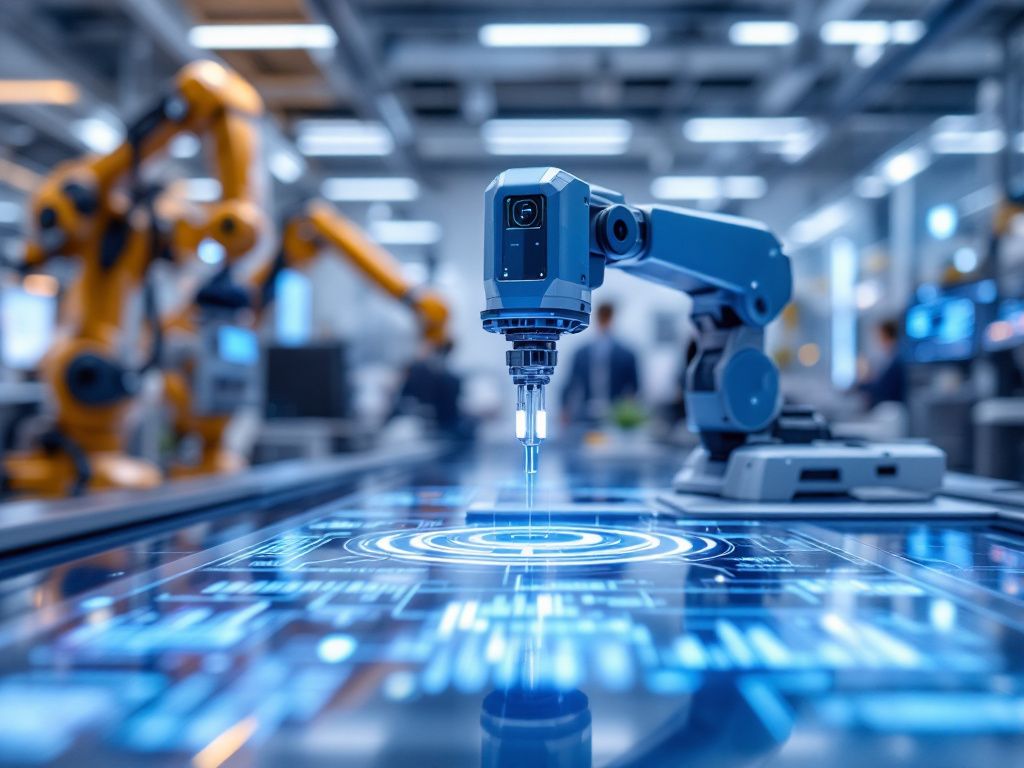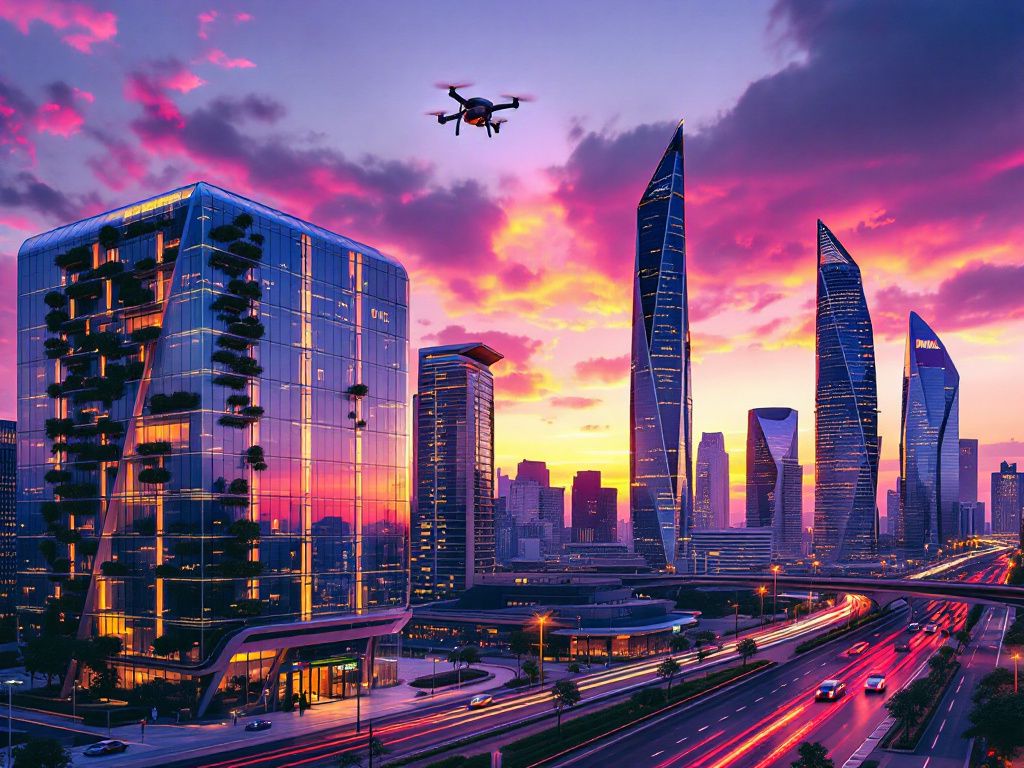Technological innovations represent the driving force behind societal transformation, encompassing new or improved technologies that revolutionize how we live and work. From historical breakthroughs like the printing press to modern advances in artificial intelligence, these innovations reshape industries and create unprecedented opportunities. Understanding their impact is crucial for navigating our rapidly evolving digital landscape and preparing for future challenges.
Good to know
Technological innovations drive productivity increases of up to 40% in businesses that successfully integrate new technologies, while creating entirely new job categories and industry sectors that didn’t exist just decades ago.
Defining technological innovations and their impact
Technological innovation represents the systematic process of creating, developing, and implementing new or significantly improved technologies, tools, systems, and processes that generate substantial advancements across multiple sectors. This comprehensive approach encompasses not only the invention of novel solutions but also the strategic application of existing technologies in innovative ways to address complex challenges and enhance operational efficiency.
The Core Elements of Technological Innovation
At its foundation, technological innovation involves the transformation of scientific knowledge and research into practical applications that deliver measurable value. This process requires the integration of multiple disciplines, combining expertise from engineering, computer science, data analytics, and domain-specific knowledge to create solutions that fundamentally change how we approach problems. The development cycle encompasses research and development phases, prototype testing, refinement of processes, and eventual market implementation, ensuring that innovations meet real-world demands and performance standards.
Modern technological innovation particularly emphasizes the utilization of data as a critical resource, enabling organizations to make informed decisions, optimize their processes, and predict future trends. Advanced data analytics and machine learning algorithms have become integral components of the innovation process, allowing for more precise targeting of solutions and continuous improvement of existing technologies.
Transformative Impact Across Multiple Sectors
The influence of technological innovations extends far beyond individual products or services, creating ripple effects that reshape entire industries and societal structures. In healthcare, innovations in medical imaging, telemedicine, and personalized medicine have revolutionized patient care delivery, enabling more accurate diagnoses and targeted treatments. Educational institutions have embraced digital learning platforms, artificial intelligence tutoring systems, and virtual reality environments that enhance learning experiences and accessibility.
Industrial sectors have experienced profound transformation through automation technologies, Internet of Things implementations, and advanced manufacturing processes that optimize production efficiency while reducing environmental impact. These technological advancements have enabled companies to streamline operations, reduce costs, and respond more rapidly to market demands while maintaining high quality standards.
Problem-Solving and Efficiency Enhancement
The primary value proposition of technological innovation lies in its capacity to address previously unsolvable problems and dramatically improve existing processes. By leveraging cutting-edge technology, organizations can automate repetitive tasks, enhance decision-making capabilities through real-time data analysis, and create new business models that were previously impossible. This systematic approach to innovation ensures that technological development aligns with practical needs while fostering continuous improvement and adaptation to evolving challenges.

Historical and modern examples of technological innovations
Throughout history, technological innovations have served as catalysts for societal transformation, reshaping how we live, work, and interact. From groundbreaking historical inventions to cutting-edge modern technologies, these advancements continue to drive progress and solve complex challenges facing humanity.
Revolutionary Historical Innovations
The printing press, invented by Johannes Gutenberg in the 15th century, democratized knowledge by making books and information accessible to the masses. This technological breakthrough laid the foundation for literacy, education, and the spread of ideas across continents. Similarly, the steam engine revolutionized transportation and manufacturing during the Industrial Revolution, while the light bulb transformed daily life by extending productive hours beyond daylight.
The personal computer emerged as another pivotal innovation, with companies like Apple pioneering user-friendly interfaces that brought computing power to individual users. The Apple II, launched in 1977, demonstrated how technological innovation could make complex technology accessible to everyday consumers, setting the stage for the digital revolution.
Modern Technological Breakthroughs
The Internet stands as perhaps the most transformative innovation of recent decades, connecting billions of people worldwide and enabling unprecedented access to information and communication. This technological foundation has enabled countless other innovations to flourish.
Artificial intelligence represents a new frontier in technological innovation, with Google’s AI systems powering everything from search algorithms to autonomous vehicles. Google’s DeepMind has achieved remarkable breakthroughs in protein folding prediction, demonstrating AI’s potential to solve complex scientific problems.
Internet of Things and Smart Technologies
The Internet of Things (IoT) has created interconnected ecosystems where everyday objects communicate and share data. Smart home devices, wearable technology, and industrial sensors exemplify how IoT innovations are enhancing efficiency and convenience across multiple sectors.
Renewable energy technologies have emerged as critical innovations addressing climate change challenges. Solar panels, wind turbines, and energy storage systems represent technological solutions that are reshaping the global energy landscape while promoting environmental sustainability.

Benefits of technological innovation in businesses
Technological innovation has become a cornerstone of modern business success, fundamentally transforming how companies operate, compete, and deliver value to their customers. As organizations navigate an increasingly digital landscape, the strategic implementation of technological advancements offers unprecedented opportunities for growth and efficiency.
Enhanced Productivity and Operational Excellence
The integration of technological innovation directly translates to significant productivity gains across various business processes. Automation technologies, artificial intelligence, and machine learning algorithms enable companies to streamline repetitive tasks, allowing employees to focus on higher-value activities that require creativity and strategic thinking. Data analytics tools provide real-time insights into operational performance, enabling managers to make informed decisions quickly and optimize resource allocation. Cloud computing platforms facilitate seamless collaboration among distributed teams, reducing time-to-market for new products and services while maintaining high quality standards.
Process Optimization and Cost Reduction
Modern businesses leverage technological innovation to dramatically reduce operational costs through intelligent process automation and predictive maintenance systems. Internet of Things (IoT) sensors monitor equipment performance, preventing costly breakdowns before they occur. Supply chain management systems utilize blockchain technology to enhance transparency and reduce fraud, while robotic process automation handles routine administrative tasks with minimal human intervention. These innovations collectively contribute to substantial cost savings that can be reinvested in research and development or passed on to customers through competitive pricing.
Revolutionizing Customer Relationships and Market Reach
Technological innovation has transformed how businesses interact with their customers, creating more personalized and engaging experiences. Customer relationship management (CRM) systems powered by artificial intelligence analyze purchasing patterns and preferences to deliver targeted recommendations and support. Mobile applications and digital platforms enable 24/7 customer service through chatbots and virtual assistants, improving response times and satisfaction rates. Social media integration allows companies to build stronger brand communities and gather valuable feedback for continuous improvement.
Sustainable Practices and Environmental Responsibility
Innovation drives sustainable business practices through energy-efficient technologies and environmentally conscious processes. Smart building systems optimize energy consumption, while renewable energy integration reduces carbon footprints. Digital transformation initiatives reduce paper consumption and travel requirements through virtual collaboration tools. These sustainable practices not only contribute to environmental preservation but also appeal to increasingly eco-conscious consumers and investors, creating competitive advantages in the market.
Job Creation and Workforce Evolution
While technological innovation automates certain roles, it simultaneously creates new job opportunities in emerging fields such as data science, cybersecurity, and digital marketing. Companies require skilled professionals to implement, maintain, and optimize these technological solutions, leading to demand for specialized expertise in areas like cloud architecture, artificial intelligence development, and user experience design.

The future of technological innovations: Challenges and opportunities
The landscape of technological innovation continues to evolve at an unprecedented pace, presenting both remarkable opportunities and significant challenges that will define our global future. As we advance into 2025 and beyond, the convergence of emerging technologies promises to reshape industries, societies, and international relationships in ways we are only beginning to understand.
Emerging Technologies Reshaping Tomorrow
Biotechnology stands at the forefront of revolutionary change, with gene editing technologies like CRISPR-Cas9 enabling precise modifications that could eliminate hereditary diseases and enhance agricultural productivity. The sector is projected to reach $2.4 trillion globally by 2028, driven by advances in personalized medicine and synthetic biology. Meanwhile, nanotechnology offers unprecedented precision in manufacturing, medicine, and environmental solutions, with applications ranging from targeted drug delivery systems to self-healing materials that could transform infrastructure maintenance.
Quantum computing represents perhaps the most transformative technological frontier, promising computational power that could solve complex problems in minutes that would take classical computers millennia. Current investments in quantum research exceed $15 billion annually across major economies, indicating the strategic importance nations place on this technology.
Global Innovation Leadership
The United States maintains its position as a technological powerhouse, investing over $600 billion annually in research and development. Silicon Valley continues to attract global talent and capital, while government initiatives like the CHIPS Act demonstrate commitment to maintaining technological supremacy. China has emerged as a formidable competitor, with its “Made in China 2025” strategy targeting leadership in artificial intelligence, biotechnology, and advanced manufacturing. The nation’s rapid progress in quantum communication and 5G infrastructure showcases its growing technological capabilities.
India’s rise as an innovation hub reflects its strong educational foundation and growing digital infrastructure. With over 50,000 startups and significant investments in biotechnology research, India is positioning itself as a key player in the global innovation ecosystem, particularly in software development and pharmaceutical innovation.
Corporate Innovation Drivers
Multinational corporations are increasingly shaping the future through strategic partnerships and acquisitions. Tech giants like Google, Microsoft, and Amazon are investing heavily in quantum computing and artificial intelligence, while pharmaceutical companies are leveraging biotechnology to develop breakthrough treatments. These corporations often drive innovation faster than traditional research institutions, creating new market dynamics and competitive landscapes.

What to remember about technological innovations
Technological innovations continue to reshape our world at an unprecedented pace, driving progress across healthcare, education, and industry sectors. As we advance into an era dominated by artificial intelligence, quantum computing, and biotechnology, the importance of embracing these changes becomes paramount. The future landscape will be shaped by emerging technologies that promise to solve complex global challenges while creating new opportunities for economic growth and social development. Organizations and individuals must adapt to this evolving technological ecosystem to remain competitive and relevant in tomorrow’s digital economy.